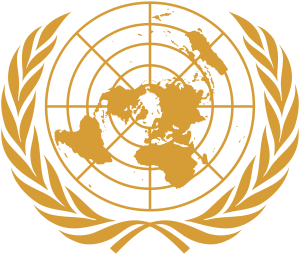United Nations General Assembly Fifth Committee
The United Nations General Assembly Fifth Committee (also known as the Administrative and Budgetary Committee or C5) is one of six main committees at the United Nations General Assembly. It deals with administrative and budgetary matters.
 | |
| Abbreviation | C5 |
|---|---|
| Legal status | Active |
| Headquarters | New York, United States |
Head | Chairperson Vacant |
Parent organization | United Nations General Assembly |
| Website | www.un.org/en/ga/fifth |
Mandate
The Fifth Committee deals with: Member State contributions to the regular and peacekeeping budgets of the organisation, how Member State contributions are allocated, the programme and peacekeeping budgets of the United Nations and human resources issues. It also is responsible for administrative matters, such as: management reform, governance, oversight and accountability issues. Finally, it is responsible for examining all draft resolutions with budget implications before they can head to the Plenary.[1]
Working Methods
The work of the Fifth Committee is split into three sessions:[1][2]
- A main session lasting from September to December.
- A resumed session in March in which any items not concluded in the main part of the session are considered.
- A second resumed session in May in which the administrative and budgetary aspects of United Nations Peacekeeping are considered.
The work of the Committee begins when reports are introduced in formal meetings, which are followed by discussion in informal meetings. Following these meetings, draft resolutions are created and discussed in informal consultations. There are two readings per draft resolution. If consensus cannot be reached, the resolution is not passed by the Committee. However, if there is consensus, the draft resolution is first adopted informally, then tabled by the Chair and, finally, formally adopted by the Committee. The Committee rarely formally votes as most resolutions are adopted by consensus.[1]
As all draft resolutions with budget implications must be examined by the Committee, it is usually the last committee to complete its work, usually in mid- to late-December.[1]
Reporting Bodies
The following bodies report through the Fourth Committee to the General Assembly:[1]
- Advisory Committee on Administrative and Budgetary Questions (ACABQ)
- Board of Auditors
- Committee on Conferences
- Committee on Contributions
- Committee on Programme Coordination (CPC)
- Independent Audit Advisory Committee (IAAC)
- International Civil Service Commission (ICSC)
- Joint Inspection Unit (JIU)
Bureau
The following make up the bureau of the Fifth Committee for the 74th Session of the General Assembly:[3][4]
| Name | Country | Position |
|---|---|---|
| Andreas Mavroyiannis | Chairperson | |
| Mohamed Fouad Ahmed | Vice-Chair | |
| Giorgi Mikeladze | Vice-Chair | |
| Luiz Feldman | Vice-Chair | |
| Yaron Wax | Rapporteur | |
See also
References
- The GA Handbook: A Practical Guide to the United Nations General Assembly (PDF) (2nd ed.). New York: Permanent Mission of Switzerland to the United Nations. 2017. ISBN 978-0-615-49660-3.
- "Main Committees". Dag Hammarskjöld Library. United Nations. n.d. Retrieved 8 March 2019.
- "Administrative and Budgetary Committee (Fifth Committee): Bureau of the Fifth Committee of the 74th session". General Assembly of the United Nations. United Nations. n.d. Retrieved 1 October 2019.
- Manhire, Vanessa, ed. (2019). United Nations Handbook 2019–20 (PDF) (57th ed.). Wellington: Ministry of Foreign Affairs and Trade of New Zealand. ISSN 0110-1951.